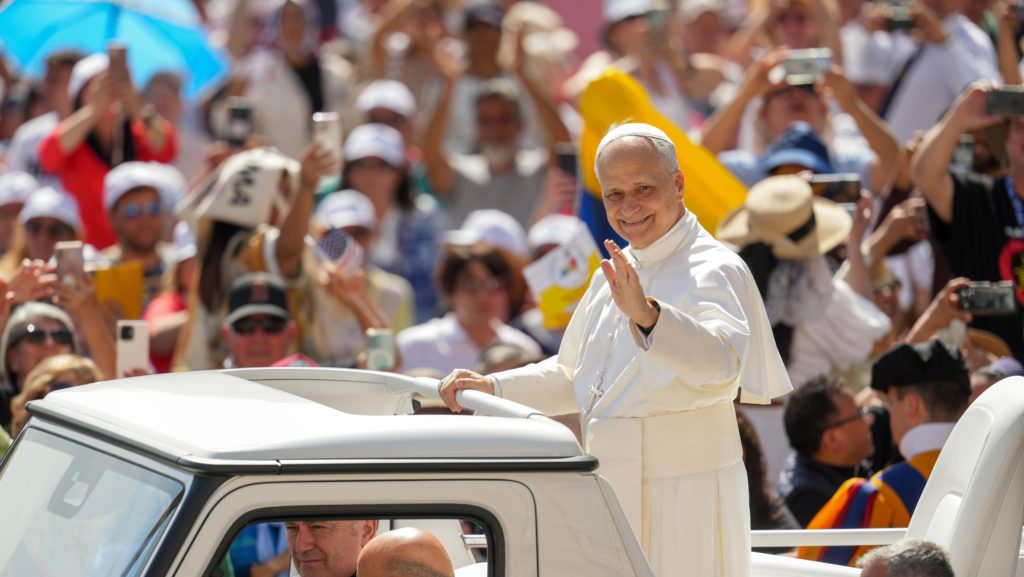God loves every person and wants to help everyone discover their inherent value and dignity, especially those who feel unworthy or unappreciated, Pope Leo XIV said.
"God wants to give his kingdom, that is, full, eternal and happy life, to everyone," the pope said June 4 as he held his weekly general audience in St. Peter's Square.
"And this is what Jesus does with us: he does not establish rankings, he gives all of himself to those who open their hearts to him," the pope said.
Pope Leo continued a series of talks focusing on Gospel parables that give hope, focusing on "The Workers in the Vineyard" in the Gospel of St. Matthew (20:1-16), which reveals the equality of all the disciples in inheriting eternal life.
Pope Leo said it is "a story that fosters our hope," because "at times we have the impression that we cannot find meaning for our lives: we feel useless, inadequate, just like the laborers who wait in the marketplace, waiting for someone to hire them to work."
"The metaphor of the marketplace is very appropriate for our times, too, because the market is the place of business, where unfortunately even affection and dignity are bought and sold, in the attempt to earn something," he said. "And when we do not feel appreciated, acknowledged, we risk selling ourselves to the first bidder."
"Instead, the Lord reminds us that our life is worthy, and his wish is to help us discover this," he said.
The Lord, represented by the owner of the vineyard in the parable, wants to establish a personal relationship with everyone he meets, and he repeatedly goes out looking for "those who are waiting to give meaning to their lives," Pope Leo said.
"This tireless master, who wants at all costs to give value to the life of every one of us," even goes out toward the end of the workday to take on those who are still waiting, he said. This shows that "even when it seems we are able to do little in life, it is always worthwhile. There is always the possibility to find meaning because God loves our life."
The landowner pays each worker the same, even those who arrived late in the day and worked fewer hours in the field, because God believes "it is just that each person has what he needs to live" because he knows their dignity, the pope said.
"The story says that the laborers from the first hour are disappointed," Pope Leo said. "They cannot see the beauty of the gesture of the landowner, who was not unjust, but simply generous, who looked not only at merit but also at need."
The "payment" God wants to give is his kingdom, and he offers the same reward of a full, eternal and happy life to everyone without "rankings," he said. The Lord gives everything to everyone who opens their hearts to him.
But, he said, "in the light of this parable, today's Christian might be tempted to think, 'Why start work immediately? If the pay is the same, why work more?'"
Pope Leo said St. Augustine responded to that question in a sermon asking why would someone delay when God is calling with a promise that they know is a sure thing. The saint warned that people do not know when their time will come, and they should be careful because a delay might mean they miss out on what God wants to give.
"I would like to say, especially to the young, do not wait, but respond enthusiastically to the Lord who calls us to work in his vineyard," the pope said. "Do not delay, roll up your sleeves, because the Lord is generous and you will not be disappointed!"
It is by "working in his vineyard" that people find the meaning of their life, he said.
Do not be discouraged "even in the dark moments of life" when answers seem to be lacking, the pope told his listeners. "The Lord is generous, and he will come soon!"
Before the general audience, Pope Leo met with members of the board of directors of the National Italian American Foundation, which educates young people about Italian culture and history, as well as provides scholarships and other charitable assistance in both countries.
"A hallmark of many who immigrated to the United States from Italy was their Catholic faith, with its rich traditions of popular piety and devotions that they continued to practice in their new nation," he said. "This faith sustained them in difficult moments, even as they arrived with a sense of hope for a prosperous future in their new country."
"In an age beset by many challenges," Pope Leo prayed that their visit to Rome would "renew your sense of hope and trust in the future."

